
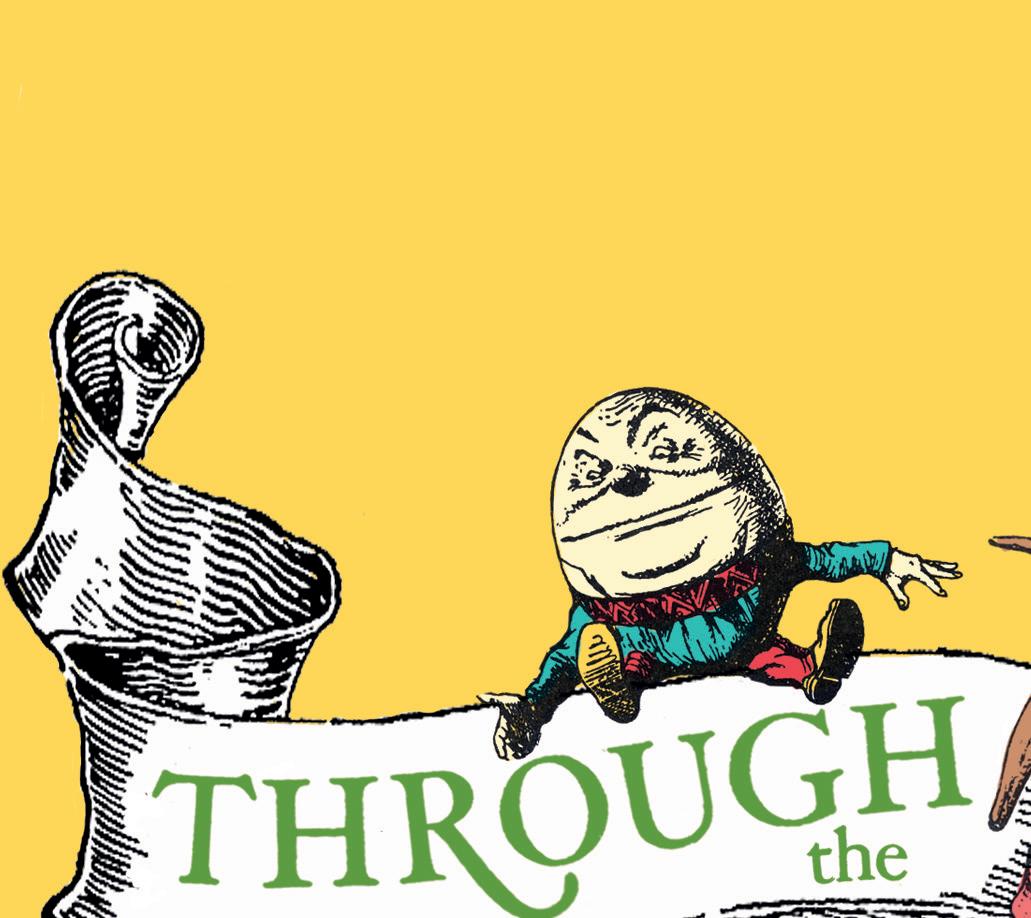



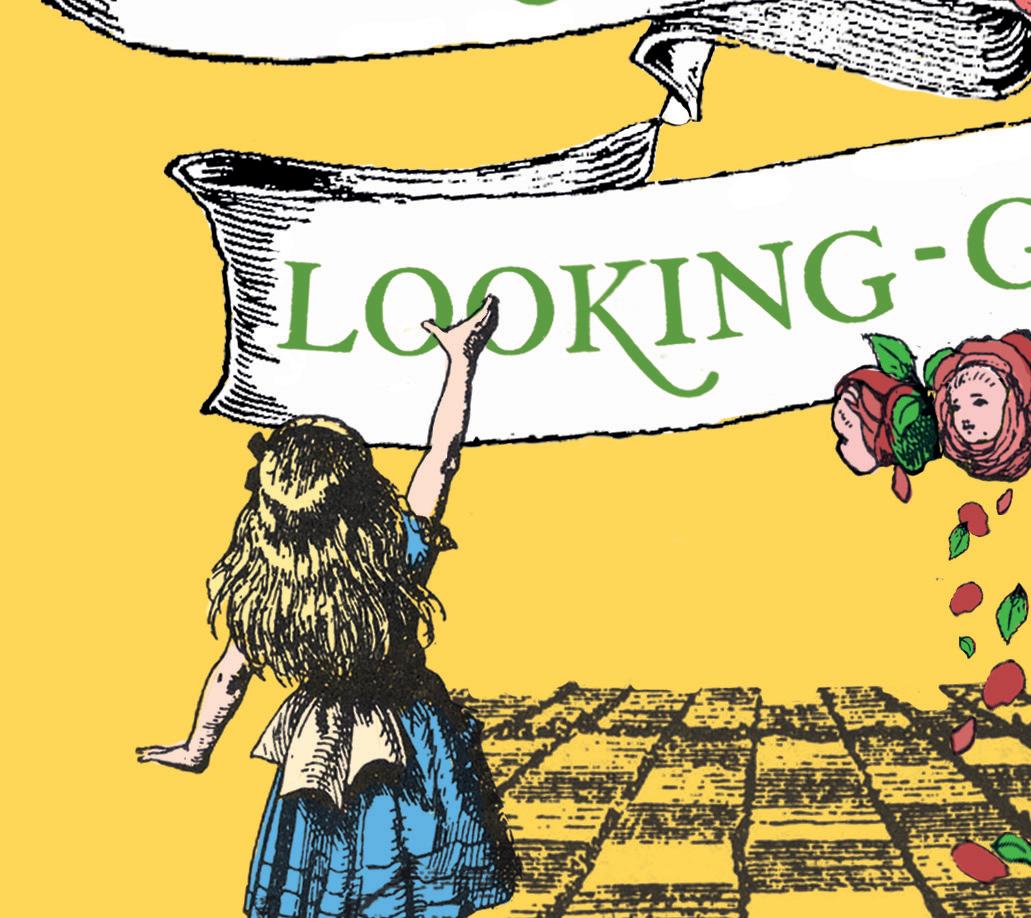
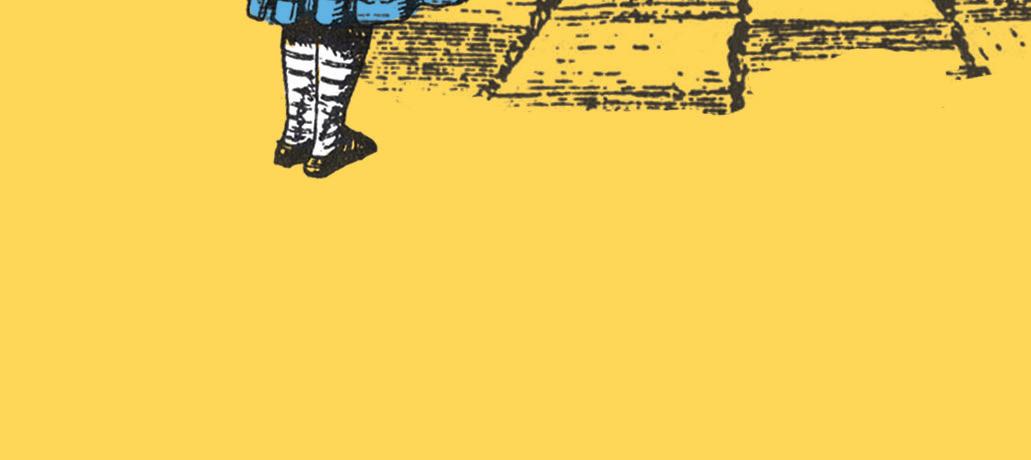
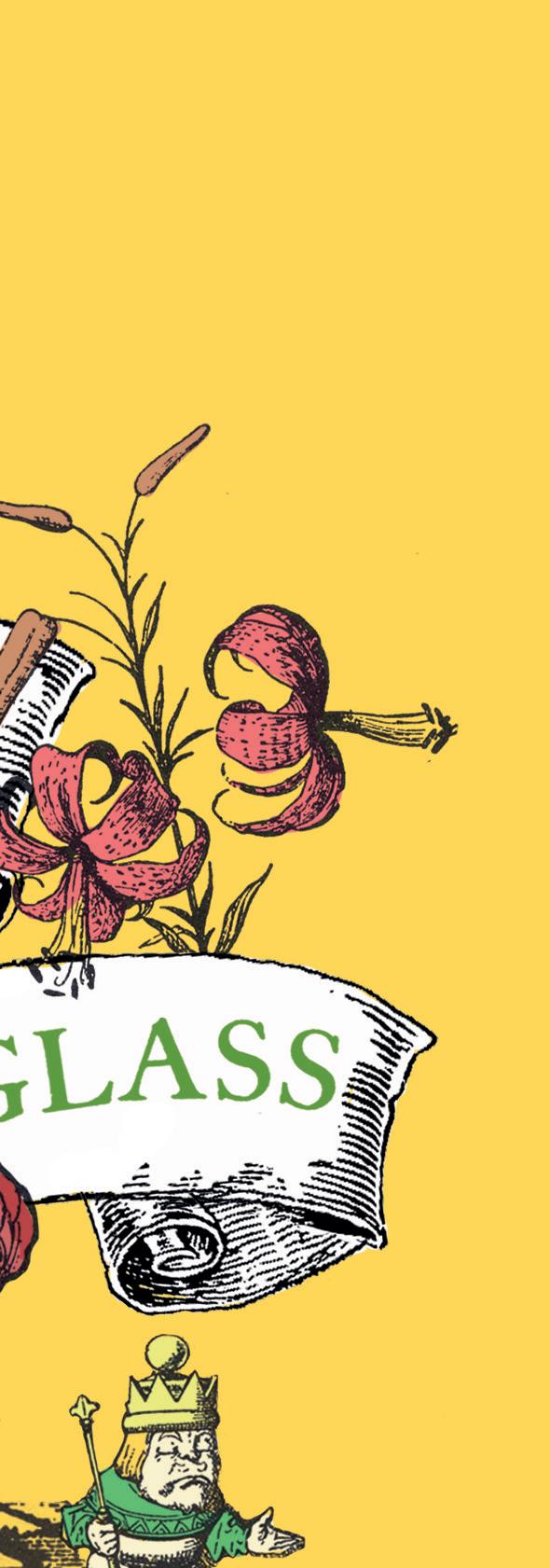
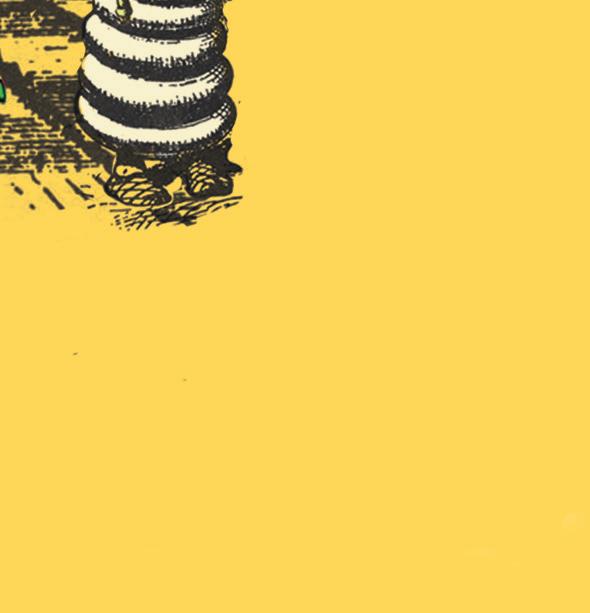
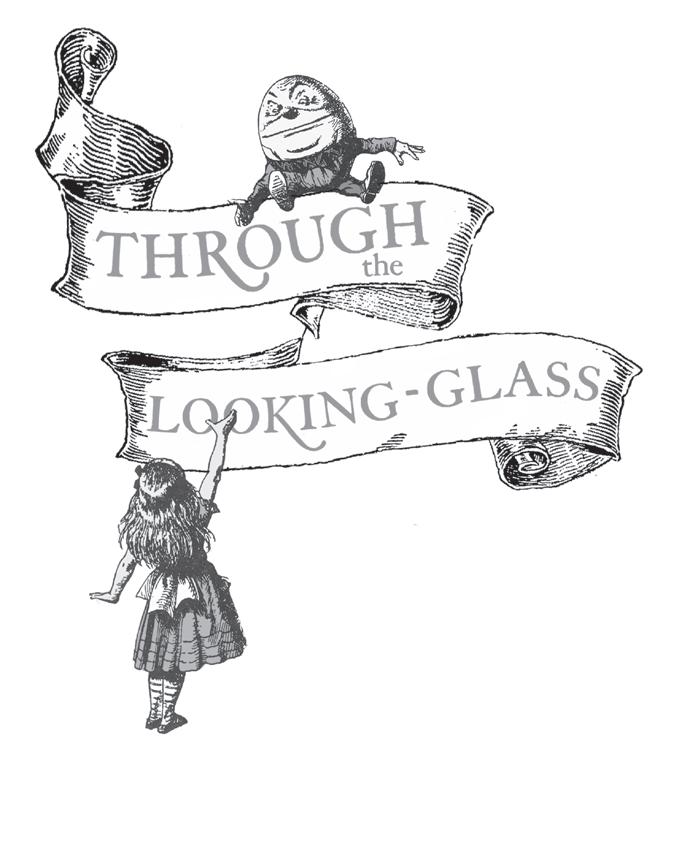
‘Oh, Kitty! how nice it would be if we could only get through into Looking-glass House! I’m sure it’s got, oh! such beautiful things in it! Let’s pretend there’s a way of getting through into it, somehow, Kitty. Let’s pretend the glass has got all soft like gauze, so that we can get through. Why, it’s turning into a sort of mist now, I declare! It’ll be easy enough to get through –’ She was up on the chimney-piece while she said this, though she hardly knew how she had got there. And certainly the glass was beginning to melt away, just like a bright silvery mist.
In another moment Alice was through the glass, and had jumped lightly down into the Looking-glass room.
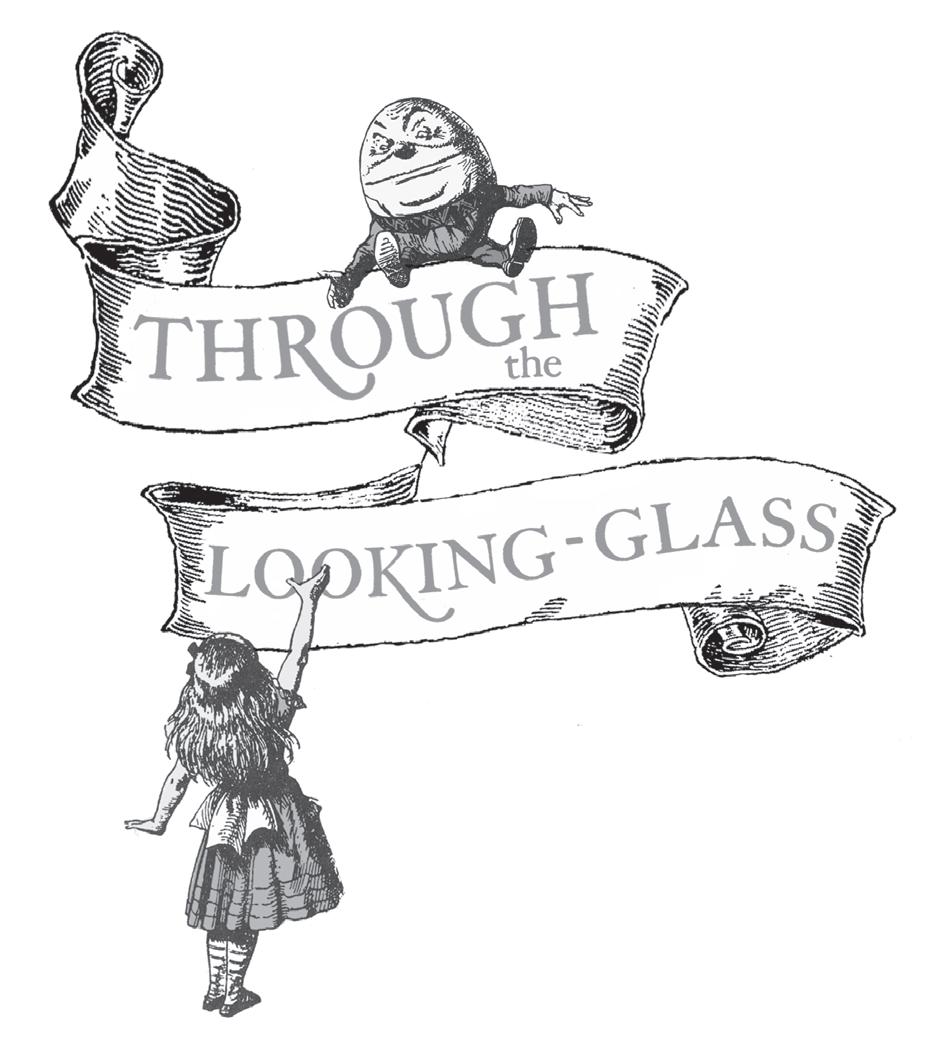
INTRODUCED BY CHRIS RIDDELL
UK | USA | Canada | Ireland | Australia
India | New Zealand | South Africa
Puffin Books is part of the Penguin Random House group of companies whose addresses can be found at global.penguinrandomhouse.com.
www.penguin.co.uk www.puffin.co.uk www.ladybird.co.uk
First published 1871
First published in Puffin Books 1948
Published with Alice’s Adventures in Wonderland in one volume 1962
Published in Puffin Classics 1984
Reissued 2010, 2015
This edition published 2025 001
Introduction copyright © Chris Riddell, 2010
Endnotes copyright © Penguin Books, 2010
Penguin Random House values and supports copyright. Copyright fuels creativity, encourages diverse voices, promotes freedom of expression and supports a vibrant culture. Thank you for purchasing an authorized edition of this book and for respecting intellectual property laws by not reproducing, scanning or distributing any part of it by any means without permission. You are supporting authors and enabling Penguin Random House to continue to publish books for everyone. No part of this book may be used or reproduced in any manner for the purpose of training artificial intelligence technologies or systems. In accordance with Article 4(3) of the DSM Directive 2019/790, Penguin Random House expressly reserves this work from the text and data mining exception.
Set in Minion by Palimpsest Book Production Limited, Falkirk, Stirlingshire
Printed and bound in Great Britain by Clays Ltd, Elcograf S.p.A.
The authorized representative in the EEA is Penguin Random House Ireland, Morrison Chambers, 32 Nassau Street, Dublin d 02 yh 68
A CIP catalogue record for this book is available from the British Library isbn : 978–0–241–73644–9
All correspondence to: Puffin Books
Penguin Random House Children’s
One Embassy Gardens, 8 Viaduct Gardens, London sw 11 7bw
Penguin Random Hous e is committed to a sustainable future for our business, our readers and our planet. is book is made from Forest Stewardship Council® certified paper.
introduction by
CHRIS RIDDELL
‘Which Alice book do you prefer?’ a writer once asked me. ‘Wonderland or Through the Looking-Glass?’ He maintained that all readers could be divided into two types: those who loved the playing-card world of Wonderland and those who preferred the chessboard landscape of Through the Looking-Glass. It is a difficult choice. Both books are full of Carroll’s fantastic characters, beautifully illustrated by Sir John Tenniel. I’ve always loved Alice’s Adventures in Wonderland – the white rabbit with his immaculate waistcoat and fobwatch, the Madhatter’s tea party and the Mock Turtle’s songs. Through the Looking-Glass, on the other hand, has Tweedledum and Tweedledee, Humpty Dumpty and the wonderful White Knight.
Like Tenniel, Lewis Carroll’s superb illustrator, I am a political cartoonist and I have often borrowed the great man’s creations, ‘with apologies to Tenniel’, in my cartoons. I’ve drawn government ministers as Tweedledum and
Tweedledee, several prime ministers as Humpty Dumpty falling off high walls and, once, an iron lady on the White Knight’s horse.
In many ways Through the Looking-Glass is a mirror image of Alice’s Adventures in Wonderland. The first book begins outdoors, beside a river on a warm summer’s day, while Through the Looking-Glass begins indoors, in a sitting room on a cold winter’s night six months later. In Wonderland Alice grows and shrinks in size, while in the Looking-Glass world time moves backwards and Alice has to run at full pelt to stay in one place. As the Red Queen tells her, ‘Now, here, you see, it takes all the running you can do, to keep in the same place. If you want to get somewhere else, you need to run at least twice as fast as that!’ Later the White Queen explains that the advantage of living backwards is that the memory works both ways and that she can remember things that happened the week after next, for instance: ‘There’s the King’s Messenger. He’s in prison now, being punished; and the trial doesn’t even begin till next Wednesday; and of course the crime comes last of all.’ The King’s messenger is a familiar face from Wonderland.
Both worlds are absurd and funny, but it is the poems that make Through the Looking-Glass so special for me. This book includes two of the greatest nonsense poems ever written. In ‘The Walrus and the Carpenter’ two absurd
characters wander along the seashore with smartly dressed oysters tripping along behind them:
Their coats were brushed, their faces washed, Their shoes were clean and neat –
And this was odd, because, you know, They hadn’t any feet.
The Walrus charms the oysters with my favourite lines in the poem:
‘The time has come,’ the Walrus said, ‘To talk of many things: Of shoes – and ships – and sealing-wax –Of cabbages – and kings –And why the sea is boiling hot –And whether pigs have wings.’
I’ve drawn my fair share of winged pigs as a cartoonist. But what makes Through the Looking-Glass a classic is the short poem in mirror-writing in the very first chapter. Alice holds it up to the looking-glass in order to read ‘Jabberwocky’. The nonsense words it contains have made their way into the English language – ‘chortled’, ‘burbled’, ‘whiffling’ and, of course, ‘galumphing’. Other words light up the imagination like fireworks:
’Twas brillig, and the slithy toves, Did gyre and gamble in the wabe; All mimsy were the borogoves, And the mome raths outgrabe.
If you want to know what that means, try Humpty Dumpty’s explanations in chapter six.
So, in answer to that writer’s question, I think I’d have to choose the back-to-front chessboard world of Through the Looking-Glass where, brillig or not, I’d happily gyre and gimble in the wabe until those mome raths finally outgrabe.
dramatis personæ (As arranged before commencement of game)
white
pieces . . . pawns
Tweedledee . Daisy
Unicorn . . . Haigha
Sheep . . . . Oyster
W. Queen . . ‘Lily’
W. King . . . Fawn
Aged man . . Oyster
W. Knight . . Hatta
Tweedledum . Daisy
red
pieces . . . pawns
Daisy . . . . Humpty Dumpty
Messenger . . Carpenter
Oyster. . . . Walrus
Tiger-lily . . . R. Queen
Rose . . . . R. King
Frog . . . . . Crow
Oyster. . . . R. Knight
Daisy . . . . Lion
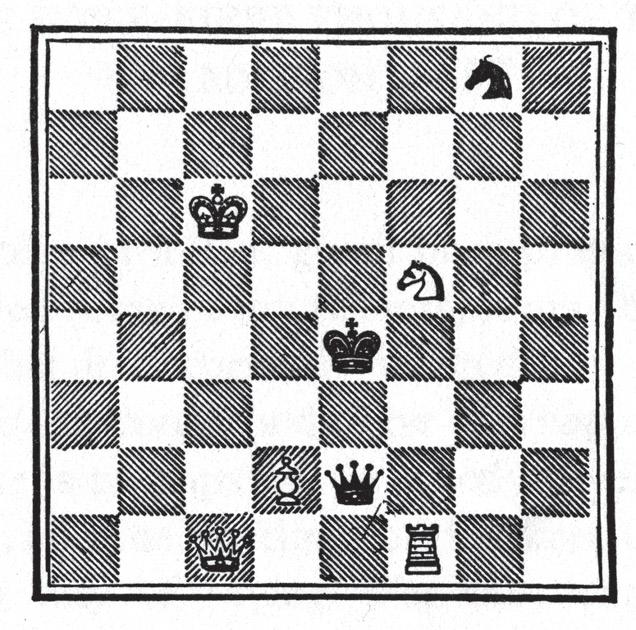
1. Alice meets R.Q. 25
2. Alice through Q.’s 3d (by railway) 34 to Q.’s 4th (Tweedledum and Tweedledee) 47
3. Alice meets W.Q. (with shawl) 65
4. Alice to Q.’s 5th (shop, river, shop) 72
5. Alice to Q.’s 6th (Humpty Dumpty) 81
6. Alice to Q.’s 7th (forest) 111
7. W.Kt. takes R.Kt. 116
8. Alice to Q.’s 8th (coronation) 132
9. Alice becomes Queen 141
10. Alice castles (feast) 147
1. R.Q. to K.R.’s 4th 32
2. W.Q. to Q.B.’s 4th (after shawl) 65
3. W.Q. to Q.B.’s 5th (becomes sheep) 72
4. W.Q. to K.B.’s 8th (leaves egg on shelf) 80
5. W.Q. to Q.B.’s 8th (flying from R.Kt.) 106
6. R.Kt. to K.’s 2nd (ch.) 113
7. W.Kt. to K.B.’s 5th 131
8. R.Q. to K.’s sq. (examination) 135
9. Queens castle 143
10. W.Q. to Q.R.’s 6th (soup) 152
11. Alice takes R.Q. & wins 155 page
From the author ’ s preface to the sixty -first thousand of the 6/- edition, 1897
Asthe chess-problem, given on a previous page, has puzzled some of my readers, it may be well to explain that it is correctly worked out, so far as the moves are concerned. The alternation of Red and White is perhaps not so strictly observed as it might be, and the ‘castling’ of the three Queens is merely a way of saying that they entered the palace: but the ‘check’ of the White King at move 6, the capture of the Red Knight at move 7, and the final ‘checkmate’ of the Red King, will be found, by any one who will take the trouble to set the pieces and play the moves as directed, to be strictly in accordance with the laws of the game.
The new words, in the poem Jabberwocky (see pp. 15–18), have given rise to some differences of opinion as to their pronunciation: so it may be well to give instructions on that point also. Pronounce ‘slithy’ as if it were the two words ‘sly, the’: make the ‘g’ hard in ‘gyre’ and ‘gimble’: and pronounce ‘rath’ to rhyme with ‘bath.’
Christmas, 1896
Child of the pure unclouded brow And dreaming eyes of wonder! Though time be fleet, and I and thou Are half a life asunder, Thy loving smile will surely hail The love-gift of a fairy-tale.
I have not seen thy sunny face, Nor heard thy silver laughter: No thought of me shall find a place In thy young life’s hereafter –Enough that now thou wilt not fail To listen to my fairy-tale.
A tale begun in other days, When summer suns were glowing –A simple chime, that served to time The rhythm of our rowing –Whose echoes live in memory yet, Though envious years would say ‘forget.’
Come, hearken then, ere voice of dread, With bitter tidings laden, Shall summon to unwelcome bed
A melancholy maiden! We are but older children, dear, Who fret to find our bedtime near.
Without, the frost, the blinding snow, The storm-wind’s moody madness –Within, the firelight’s ruddy glow, And childhood’s nest of gladness. The magic words shall hold thee fast: Thou shalt not heed the raving blast.
And though the shadow of a sigh May tremble through the story, For ‘happy summer days’ gone by, And vanish’d summer glory –It shall not touch with breath of bale The pleasance of our fairy-tale.
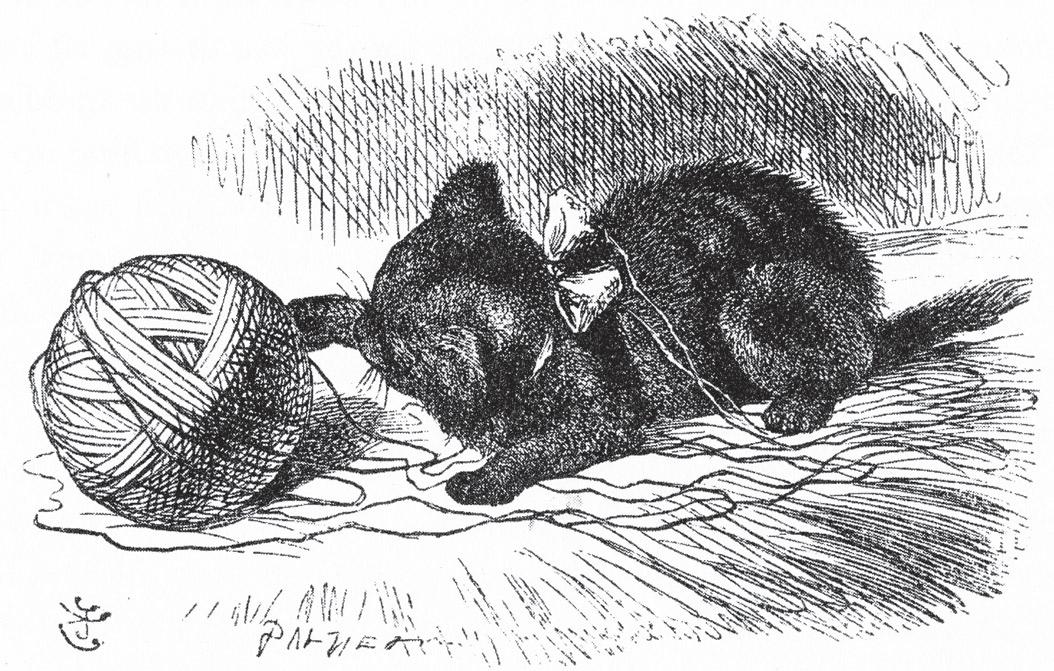
Onething was certain, that the white kitten had had nothing to do with it: – it was the black kitten’s fault entirely. For the white kitten had been having its face washed by the old cat for the last quarter of an hour (and bearing it pretty well, considering); so you see that it couldn’t have had any hand in the mischief.
The way Dinah washed her children’s faces was this: first she held the poor thing down by its ear with one paw, and then with the other paw she rubbed its face all over, the wrong way, beginning at the nose: and just now, as I
said, she was hard at work on the white kitten, which was lying quite still and trying to purr – no doubt feeling that it was all meant for its good.
But the black kitten had been finished with earlier in the afternoon, and so, while Alice was sitting curled up in a corner of the great arm-chair, half talking to herself and half asleep, the kitten had been having a grand game of romps with the ball of worsted Alice had been trying to wind up, and had been rolling it up and down till it had all come undone again; and there it was, spread over the hearth-rug, all knots and tangles with the kitten running after its own tail in the middle.
‘Oh, you wicked wicked little thing!’ cried Alice, catching up the kitten, and giving it a little kiss to make it understand that it was in disgrace. ‘Really, Dinah ought to have taught you better manners! You ought, Dinah, you know you ought!’ she added, looking reproachfully at the old cat, and speaking in as cross a voice as she could manage – and then she scrambled back into the arm-chair, taking the kitten and the worsted with her, and began winding up the ball again. But she didn’t get on very fast, as she was talking all the time, sometimes to the kitten, and sometimes to herself. Kitty sat very demurely on her knee, pretending to watch the progress of the winding, and now and then putting out one paw and gently touching the ball, as if it would be glad to help if it might.
‘Do you know what to-morrow is, Kitty?’ Alice began.
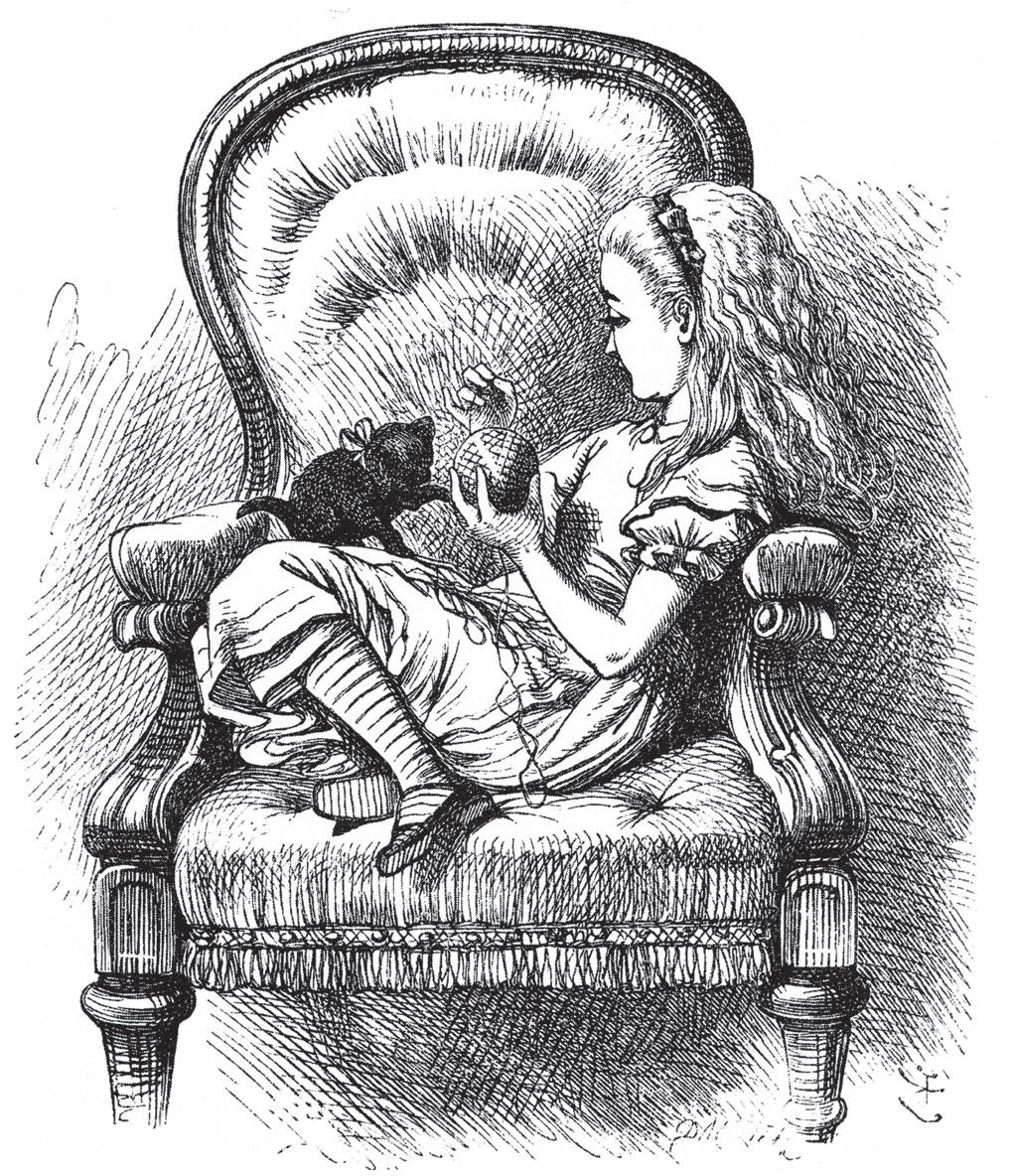
‘You’d have guessed if you’d been up in the window with me – only Dinah was making you tidy, so you couldn’t. I was watching the boys getting in sticks for the bonfire –and it wants plenty of sticks, Kitty! Only it got so cold, and it snowed so, they had to leave off. Never mind, Kitty, we’ll go and see the bonfire to-morrow.’ Here Alice wound two or three turns of the worsted round the kitten’s neck, just to see how it would look: this led to a scramble, in which
the ball rolled down upon the floor, and yards and yards of it got unwound again.
‘Do you know, I was so angry, Kitty,’ Alice went on as soon as they were comfortably settled again, ‘when I saw all the mischief you had been doing, I was very nearly opening the window, and putting you out into the snow! And you’d have deserved it, you little mischievous darling! What have you got to say for yourself? Now don’t interrupt me!’ she went on, holding up one finger. ‘I’m going to tell you all your faults. Number one: you squeaked twice while Dinah was washing your face this morning. Now you can’t deny it, Kitty: I heard you! What’s that you say?’ (pretending that the kitten was speaking). ‘Her paw went into your eye? Well, that’s your fault, for keeping your eyes open – if you’d shut them tight up, it wouldn’t have happened. Now don’t make any more excuses, but listen! Number two: you pulled Snowdrop away by the tail just as I had put down the saucer of milk before her! What, you were thirsty, were you? How do you know she wasn’t thirsty too? Now for number three: you unwound every bit of the worsted while I wasn’t looking!
‘That’s three faults, Kitty, and you’ve not been punished for any of them yet. You know I’m saving up all your punishments for Wednesday week – Suppose they had saved up all my punishments!’ she went on, talking more to herself than the kitten. ‘What would they do at the end of a year? I should be sent to prison, I suppose, when the day